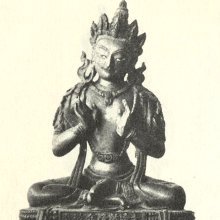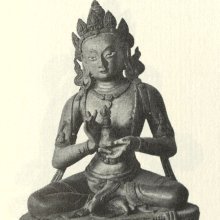Yu, Yū: 13 definitions
Introduction:
Yu means something in Hinduism, Sanskrit, Marathi, biology, Tamil. If you want to know the exact meaning, history, etymology or English translation of this term then check out the descriptions on this page. Add your comment or reference to a book if you want to contribute to this summary article.
Images (photo gallery)
(+26 more images available)
In Hinduism
Vyakarana (Sanskrit grammar)
Source: Wikisource: A dictionary of Sanskrit grammarYu (यु).—General wording including the affixes युच्, युट्, ट्युत्, ट्युल् (yuc, yuṭ, ṭyut, ṭyul) and ण्युट् (ṇyuṭ) of which only यु (yu) remains as the affix, which is changed into अन (ana) by the rule युवोरनाकौ (yuvoranākau) P.VII.1.1.

Vyakarana (व्याकरण, vyākaraṇa) refers to Sanskrit grammar and represents one of the six additional sciences (vedanga) to be studied along with the Vedas. Vyakarana concerns itself with the rules of Sanskrit grammar and linguistic analysis in order to establish the correct context of words and sentences.
Ganitashastra (Mathematics and Algebra)
Source: archive.org: Hindu MathematicsYu (यु) refers to the “operation of addition” (i.e., yu refers to an abbreviation from yuta, meaning added), according to the principles of Bījagaṇita (“algebra” or ‘science of calculation’), according to Gaṇita-śāstra, ancient Indian mathematics and astronomy.—There are no special symbols for the fundamental operations in the Bakhshali work. Any particular operation intended is ordinarily indicated by placing the tachygraphic abbreviation, the initial syllable of a Sanskrit word of that import, after, occasionally before, the quantity affected. Thus the operation of addition is indicated by yu (an abbreviation from yuta, meaning added), subtraction by + which is very probably from kṣa (abbreviated from kṣaya, diminished), multiplication by gu (from gum or guṇita, multiplied) and division by bhā (from bhāga or bhājita, divided).

Ganitashastra (शिल्पशास्त्र, gaṇitaśāstra) refers to the ancient Indian science of mathematics, algebra, number theory, arithmetic, etc. Closely allied with astronomy, both were commonly taught and studied in universities, even since the 1st millennium BCE. Ganita-shastra also includes ritualistic math-books such as the Shulba-sutras.
Biology (plants and animals)
Source: Google Books: CRC World Dictionary (Regional names)1) Yu in China is the name of a plant defined with Colocasia esculenta in various botanical sources. This page contains potential references in Ayurveda, modern medicine, and other folk traditions or local practices It has the synonym Caladium violaceum Engl. (among others).
2) Yu in Mali is also identified with Sorghum bicolor It has the synonym Holcus saccharatus var. technicus (Körn.) Farw. (etc.).
Example references for further research on medicinal uses or toxicity (see latin names for full list):
· Tableau de l’Ecole de Botanique (1829)
· Botanical Museum Leaflets (1932)
· Helios (1893)
· Species Plantarum
· Bulletin of the National Science Museum (1952)
· Journal of Cytology and Genetics (1989)
If you are looking for specific details regarding Yu, for example pregnancy safety, side effects, health benefits, diet and recipes, extract dosage, chemical composition, have a look at these references.

This sections includes definitions from the five kingdoms of living things: Animals, Plants, Fungi, Protists and Monera. It will include both the official binomial nomenclature (scientific names usually in Latin) as well as regional spellings and variants.
Languages of India and abroad
Marathi-English dictionary
Source: DDSA: The Molesworth Marathi and English Dictionaryyū (यू).—ind A word or sound used in calling a dog.
Marathi is an Indo-European language having over 70 million native speakers people in (predominantly) Maharashtra India. Marathi, like many other Indo-Aryan languages, evolved from early forms of Prakrit, which itself is a subset of Sanskrit, one of the most ancient languages of the world.
Sanskrit dictionary
Source: DDSA: The practical Sanskrit-English dictionaryYu (यु).—I. 2 P. (yauti, yuta; caus. yāvayati; desid. yiyaviṣati or yuyūṣati)
1) To join, unite.
2) To mix, combine. -II. 3 P. (yuyoti) To detach, separate; as in युतसिद्ध (yutasiddha). -III. 9 U. (yunāti, yunīte)
1) To bind, fasten.
2) To join, unite.
3) To mix, combine
4) Ved. To give, grant.
5) To acquire.
6) To worship, respect. -IV. 1 Ā. (yāvayate) To censure. -With व्यति (vyati) to mix; अन्योन्यं स्म व्यतियुतः शब्दाञ् शब्दैस्तु भीषणान् (anyonyaṃ sma vyatiyutaḥ śabdāñ śabdaistu bhīṣaṇān) Bhaṭṭikāvya 8.6.
--- OR ---
Yū (यू).—m., f. See यूषः (yūṣaḥ) (= soup).
Source: Cologne Digital Sanskrit Dictionaries: Shabda-Sagara Sanskrit-English DictionaryYu (यु).—r. 2nd cl. (yoti) 1. To mix, to join, to blend. 2. To separate or not mix. r. 10th cl. (yāvayate) To censure, to blame, to disrespect, to despise. (ña) yuñ r. 9th cl. (yunāti yunīte) To bind, to tie.
--- OR ---
Yū (यू).—f.
(-yūḥ) The water in which pulse, &c. has been boiled, pease-soup, &c. E. yu to mix, aff. kkip, and vowel made long.
Source: Cologne Digital Sanskrit Dictionaries: Benfey Sanskrit-English DictionaryYu (यु).—ii. 2, [Parasmaipada.], and ii. 9, yunā, yuni, [Parasmaipada.] [Ātmanepada.] 1. To bind. 2. To join, to mix. 3. To separate (? cf. 2. yu). Ptcple of the pf. pass. yuta, 1. Joined, connected, [Rāmāyaṇa] 3, 52, 26. 2. United, [Lassen, Anthologia Sanskritica.] 39, 19. 3. Attached to. 4. Endowed, full of, [Nala] 12, 2;
— With the prep. vyati vi-ati, To mix, [Bhaṭṭikāvya, (ed. Calc.)] 8, 6.- With ā ā, āyuta, Endowed, [Nala] 12, 39.
— With pra pra, prayuta, Joined. n. A million.
— With sam sam, saṃyuta, 1. Joined, mixed. 2. Heaped, [Śākuntala, (ed. Böhtlingk.)] 69, 15. 3. Endowed, [Sāvitryupākhyāna] 5, 33; [Pañcatantra] iii. [distich] 48. 4. Implying, [Mānavadharmaśāstra] 2, 32. Comp. Su-, adj. well accompanied by, [Lassen, Anthologia Sanskritica.] 50, 6.
— Cf. [Latin] juvare, jus (= ved. yos), jubere ([Causal.]); (probably for ),
--- OR ---
Yu (यु).—ii. 3, [Parasmaipada.] To keep back. [Causal.], and i. 10, [Ātmanepada.] † To despise.
— With the prep. apa apa, ii. 3, To remove,
--- OR ---
Yū (यू).—f. Pease soap (cf. yuṣa).
Source: Cologne Digital Sanskrit Dictionaries: Cappeller Sanskrit-English DictionaryYu (यु).—1. yauti yute yuvati yuvate [participle] yuta (q.v.) fasten, hold fast, bind, harness, join, unite, draw towards one’s self, attract get possession of. [Desiderative] yuyūṣati wish to attract or hold fast.
--- OR ---
Yu (यु).—2. companion, comrade.
--- OR ---
Yu (यु).—3. yuyoti yucchati yuyoti yucchate [participle] yuta tr. repel, keep or ward off, separate, protect from ([ablative]); [intransitive] keep apart, be or remain separate. [Causative] yavayati or yāvayati = [Simple] tr. [Intensive] [participle] yoyuvat yield, give way.
--- OR ---
Yu (यु).—4. driving, going, moving.
Source: Cologne Digital Sanskrit Dictionaries: Monier-Williams Sanskrit-English Dictionary1) Yu (यु):—1. yu (cf. √yuch) [class] 3. [Parasmaipada] yuyoti ([imperative] 2. sg. yuyodhi, [Ṛg-veda]; yuyudhi, [Pāṇini 3-4, 88 [Scholiast or Commentator]]; 2. [dual number] yuyotam or yuyutam, [Ṛg-veda]; 2. [plural] yuyota or tana, [ib.]; [Ātmanepada] [subjunctive] 2. sg. : yuyothās, [ib.]; [Ātmanepada] [imperfect tense] 3. [plural] ayuvanta, [Atharva-veda]; [Aorist] [Parasmaipada] yaus, ayauṣīt; [subjunctive] yoṣati, yoṣat, [Ṛg-veda]; yūṣat, [Atharva-veda]; yūyāt, yūyātām, [Brāhmaṇa]; yūyot, [Ṛg-veda]; yāvīs, [ib.]; [Ātmanepada] yoṣṭhās, [Brāhmaṇa]; yavanta, [Ṛg-veda]; [Passive voice] ayāvi, [ib.]; [infinitive mood] yotave, tavai, tos, [ib.]; -yāvam, [Atharva-veda]),
—to separate, keep or drive away, ward off ([accusative]), exclude or protect from ([ablative]), [Ṛg-veda; Atharva-veda; Vājasaneyi-saṃhitā; Brāhmaṇa];
—to keep aloof, to be or remain separated from ([ablative]), [Ṛg-veda; Atharva-veda; Śāṅkhāyana-śrauta-sūtra] :
—[Causal] yavayati or yāvayati, to cause to separate or remove or keep off etc., [Ṛg-veda; Atharva-veda; Vājasaneyi-saṃhitā; Śatapatha-brāhmaṇa] :—[Intensive] yoyavīti ([imperfect tense] ayoyavīt ; p. yoyuvat),
—to retreat back, recede, [Ṛg-veda];
—to be rent, gape asunder, [ib.];
—to keep off from ([ablative]), [Maitrāyaṇī-saṃhitā]
2) 2. yu (cf. √yuj) [class] 2. [Parasmaipada] ([Dhātupāṭha xxiv, 23]) yauti ([Vedic or Veda] also [Ātmanepada] yute and [class] 6. yuvati, te; [according to] to [Dhātupāṭha xxxi, 9] also [class] 9. yunāti, yunīte; [perfect tense] yuyāva, 2. sg. yuyavitha, [Pāṇini 6-4, 126 [Scholiast or Commentator]]; yuyuve, [Ṛg-veda]; [Aorist] -yāviṣṭam (?), [ib.]; ayaviṣṭa [grammar]; Prec. yūyāt, [ib.]; [future] yuvitā, [Śatapatha-brāhmaṇa]; yavitā, yaviṣyati, te [grammar]; [indeclinable participle] yutvā, [Pāṇini 7-2, 11 [Scholiast or Commentator]]; -yūya, [Ṛg-veda]; -yutya, [Gṛhya-sūtra and śrauta-sūtra]),
2) —to unite, attach, harness, yoke, bind, fasten, [Ṛg-veda];
2) —to draw towards one’s self, take hold or gain possession of, hold fast, [Atharva-veda; Taittirīya-saṃhitā; Śatapatha-brāhmaṇa];
2) —to push on towards ([accusative]), [Atharva-veda];
2) —to confer or bestow upon ([dative case]), procure, [Ṛg-veda];
2) — (yauti), to worship, honour, [Naighaṇṭuka, commented on by Yāska iii, 14] :—[Passive voice] yūyate ([Aorist] ayāvi) [grammar]:—[Causal] yāvayati ([Aorist] ayīyavat), [ib.] :—[Desiderative] of [Causal] yiyāvayiṣati, [ib.] :—[Desiderative] yuyūṣati ([Ṛg-veda]), yiyaviṣati ([grammar]), to wish to unite or hold fast:—[Intensive] yoyūyate, yoyoti, yoyavīti etc. (See ā-, ni-√yu).
3) 3. yu mfn. (√yā) going, moving, [Ṛg-veda i, 74, 7; x, 176, 3 (viii, 18, 13 ?). ]
4) 4. yu the actual base of the [dual number] and [plural] numbers of the 2nd [person] [pronoun] (See yuṣmad).
5) Yū (यू):—m. (or f.) soup, pease-soup, broth (= yūṣa), [cf. Lexicographers, esp. such as amarasiṃha, halāyudha, hemacandra, etc.]
Source: Cologne Digital Sanskrit Dictionaries: Yates Sanskrit-English Dictionary1) Yu (यु):—(la) yauti 2. a. To mix; to separate; (ña, ga) yunāti, note to bind. (ka) yāvayati 10. a. To blame.
2) Yū (यू):—(yūḥ) 3. f. The water in which pulse, &c. has been boiled.
[Sanskrit to German]
Sanskrit, also spelled संस्कृतम् (saṃskṛtam), is an ancient language of India commonly seen as the grandmother of the Indo-European language family (even English!). Closely allied with Prakrit and Pali, Sanskrit is more exhaustive in both grammar and terms and has the most extensive collection of literature in the world, greatly surpassing its sister-languages Greek and Latin.
Tamil dictionary
Source: DDSA: University of Madras: Tamil LexiconYu (யு) . The compound of ய் [y] and உ. [u.]
--- OR ---
Yū (யூ) . The compound of ய் [y] and ஊ. [u.]
Tamil is an ancient language of India from the Dravidian family spoken by roughly 250 million people mainly in southern India and Sri Lanka.
See also (Relevant definitions)
Starts with (+1043): Yu bao gao ben, Yu chien, Yu chu, Yu e mu, Yu hsing tsao, Yu hun-tun, Yu jiu hua, Yu jiu hua shu, Yu kao liang, Yu mai shan ma gan, Yu mai ye shan hua, Yu mao, Yu mei ren, Yu mi, Yu mi shu, Yu mi xu, Yu min bei mu, Yu mou, Yu mu, Yu ni sa nna ka.
Ends with (+949): Aayu, Abayu, Abhidyu, Abhimanyu, Abhipracyu, Abhivipanyu, Abhiyu, Abhyayu, Abhyukshana, Acaiyu, Achyutayu, Acyu, Acyutayu, Adabdhayu, Adagyu, Addayu, Addhayu, Adevayu, Adharedyu, Adhijarayu.
Full-text (+668): Sarayu, Shamyu, Yuta, Ayu, Devayu, Mitrayu, Upeyus, Dharmayu, Shubhamyu, Anasuyu, Malayu, Vishvayu, Jayu, Sthirayu, Anuyu, Ahamyu, Gatayus, Prayuta, Ahamya, Yuyu.
Relevant text
One of your search terms exceeds the minimun character amount per search term. This amount currently equals 2.
No search results for Yu, Yū, Yoo; (plurals include: Yoos) in any book or story.





